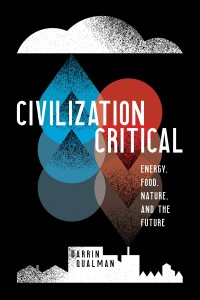FLEdGE review of Civilization Critical

Civilization Critical
Energy, Food, Nature, and the Future
You probably don’t know all the facts that Darrin Qualman discusses in Civilization Critical, but even if you did, you should still read the book for its powerful synthesis of those facts. The book’s central argument is that contemporary human lifestyles rely on linear economies. We extract, consume and dispose of goods at unprecedented rates, growing the landfills and ocean dead zones. The myth of “dematerialized” information economy falls apart given the evidence that despite the growth in non-material commerce (be it services or apps) humanity’s consumption of material goods and energy continues to increase. This global “petro-industrial consumerist civilization” (p. 1) or eCivilization, to use Qualman’s shorthand, is headed for disaster. “Linear civilizations are terminal” he writes (p. 59).
The alternative to this civilization, Qualman argues, is to be found in circular flows that have characterized many pre-modern societies, some contemporary communities, and even the early Industrial Revolution-era Europe. These flows work by looping materials and energy in ways that mimic nature. Nowhere is the loss of this circularity better observed than in agriculture, where circularity of farming started to be replaced with linearity just over a century ago with mechanization, chemical inputs (particularly synthetic fertilizer), and technical “expertise”. Qualman is careful to note that this linear, industrial agriculture, has had some positive outcomes too, and he is reluctant to condemn all practitioners of modern agriculture. Nevertheless, he identifies the linearization of agriculture as the foundation upon which we have linearized all other areas of life, paving way for “a comprehensive restructuring of human civilizations and economies” (p. 47).
Nowhere is the loss of this circularity better observed than in agriculture, where circularity of farming started to be replaced with linearity just over a century ago with mechanization, chemical inputs (particularly synthetic fertilizer), and technical “expertise”.
The scope of what Civilization Critical covers is extensive, but Qualman’s accessible writing style makes it an easy read and an excellent teaching tool. In place of a summary of the book, an example may serve better to illustrate what it is that the book does so well. In the chapter that deals with efficiency (Chapter 23), Qualman introduces the Jevons paradox, the 1865 observation by the economist William Stanley Jevons that as the production of something becomes more efficient, cost of it falls and consumption increases – outweighing any resource conservation achieved through the greater efficiency. “Efficiency is good” Qualman writes, “What is not good is that too many people assume that efficiency itself leads to decreased material and energy use and lower greenhouse gas emissions” (p. 185).
If you want to dig up the antecedents of Qualman’s linear-circular argument, you are bound to find many, but this does not make the book any less original. Qualman’s ability to use this argument to articulate both the most pressing issues of our times and the solutions at our disposal is impressive. Qualman’s research is meticulous and the sheer volume of information included in this book is virtually encyclopedic. His storytelling through numbers is superb, and he is careful not to romanticize the past but instead make pragmatic, well-supported observations. The book is at once an historical account, social critique, analysis of power structures, and spiritual appeal. We don’t have to choose doom, Qualman concludes, because solutions are all around us. We just have to make wiser choices. Don’t be fooled by the simplicity of that argument. Read the book, share it with others, and if you teach, assign it to your students. It’s a gem.
— FLEdGE, Sept. 2019

